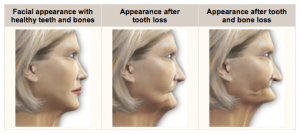Missing teeth are a cause for concern for millions of Americans. In fact, 69% of adults have lost at least one permanent tooth. By age 74, 26% of adults will have lost all their teeth. The traditional solution to missing teeth is a full denture. A denture is a removable prosthetic appliance designed to fit over the edentulous (toothless) jaw to replace the natural teeth.
Dentures Are Not Very Functional

Is It Time To Ditch Your Denture?
Many people with damaged and decayed teeth assume that the solution to ending their discomfort and expensive dental bills is to remove all the teeth and wear a denture. All too often, patients who have tried this approach find out the hard way that a denture does not look, function or feel like natural teeth, and it rarely solves the problem the way they had hoped. In fact, many denture patients find that rather than solve their dental problems, they have just traded them for a new set of problems.
Common Denture Problems
Dysfunctional dentures are common, especially in patients who have been missing their teeth for a long time. Because your jaw maintains it’s size and shape only when there are natural teeth present in the bone, edentulous patients find that their jaw changes size and shape considerably over time. The unstimulated jaw bone shrinks away and the process is accelerated when a denture is sitting atop the gums applying pressure on a constant basis through normal activity like eating and talking. As the jaw bone shrinks, the denture becomes loose or does not fit properly. In a mild case, the denture can be adjusted or relined in order to create a better fit, but the process will continue in a vicious cycle until the jaw bone has receded so severely that it can no longer hold a denture in place, even with denture adhesives.
In addition to loose dentures, many patients find that it is impossible to eat the foods they used to enjoy. Biting and chewing can become difficult because a denture does not provide the stability and strength of natural teeth. Some patients also complain of problems such as denture sores and painful dentures.
How Dentures Make You Look Old

Loss of Vertical Dimension
The physical changes in the jaw which occur with the loss of the permanent teeth affect more than function. They affect appearance as well. As the jaw bone shrinks, the face changes shape. As the bite changes, the jaws no longer come together properly. Over time, the distance between the nose and the chin shortens in a condition called “loss of vertical dimension”. It is the shrinkage of the jaw that causes the hollow, overclosed and sunken facial appearance that makes a person look much older than they really are.
How To Restore Dental Function, Facial Appearance and Ditch Your Denture For Good
Dental implants have long been favored by dentists and oral surgeons as the most reliable, natural and functional way to replace missing teeth. Advances in implant dentistry make it possible for almost any denture-wearer to regain dental function and stop the progression of bone loss in the jaws. Because dental implants are placed directly into the jaw bone, they act as a synthetic tooth root, stimulating the bone and preventing the progression of loss of vertical dimension. Reliable and predictable, dental implants are 97% successful over 50 years. This means that there is a very strong likelihood that tooth replacement with dental implants will last you the rest of your life. Providing a strong foundation for restoration of a complete dental arch, implants restore a patient’s ability to bite and chew unencumbered. In addition, appearance is preserved, comfort and functionality are restored. Dental implant patients never have to worry that their denture is going to click, slip or fall out during normal activity.
For more information about whether ditching your denture for dental implants is the best option for you, click here.
Statistics provided by AAOMS http://www.aaoms.org/conditions-and-treatments/dental-implants/

